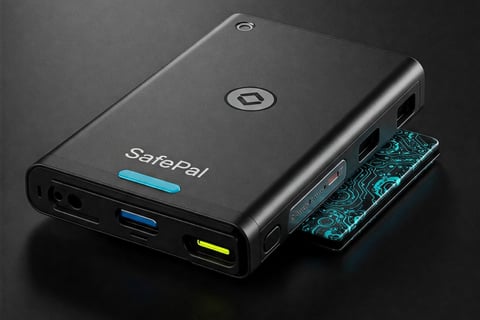The Public Ledger, Irreversible Transactions, and a World Beyond Bitcoin: What Every Crypto Holder Needs to Know
This article demystifies common cryptocurrency misconceptions, explaining that transactions on public ledgers are pseudonymous and irreversible, and that thousands of altcoins exist beyond Bitcoin. It advises readers on actions to take, such as verifying addresses and conducting thorough research, to navigate the digital asset space more securely.
Krypto Head, The Crypto Lion Group
6/12/20255 min read


The Public Ledger, Irreversible Transactions, and a World Beyond Bitcoin: What Every Crypto Holder Needs to Know
The world of cryptocurrency is often painted with broad strokes, leading to common misconceptions that can significantly impact users. While narratives of anonymity and instant riches dominate headlines, the reality is far more nuanced. For anyone involved in or considering entering the digital asset space, understanding the fundamental truths about how cryptocurrencies operate is paramount. Let's peel back the layers and explore what these realities mean for you, and what actions you should consider taking.
"Did You Know? Not All Cryptocurrencies Are Anonymous." What That Means for You.
One of the most persistent myths surrounding cryptocurrency is its absolute anonymity. The image of shadowy figures making untraceable transactions persists, yet the reality is quite different. While certainly more private than traditional banking in some respects, most cryptocurrency transactions are recorded on a public, immutable ledger known as a blockchain.
This public ledger, a decentralized database, meticulously records every transaction, including the sender's and recipient's wallet addresses and the exact transaction amount. While these wallet addresses are strings of alphanumeric characters rather than personal names, they are not entirely anonymous. Think of it like a bank account number that's publicly visible, but without your name directly attached.
What this means for you: Your transactions, while not immediately tied to your identity, leave a digital footprint. This footprint can, under certain circumstances, be linked back to you. For instance, if you purchase goods or services with cryptocurrency and provide a shipping address, that data point can be used to connect your wallet address to your real-world identity. Similarly, regulated exchanges often require Know Your Customer (KYC) verification, directly linking your identity to your crypto activities
Furthermore, advanced blockchain analytics tools are increasingly sophisticated, capable of tracing transaction flows and identifying patterns that could lead to deanonymization. This is particularly relevant in cases of illicit activities, where law enforcement agencies can leverage these tools to track funds.
Action you should take:
Understand the trade-offs between privacy and convenience: While some cryptocurrencies like Monero (XMR) focus on enhanced privacy features, most mainstream cryptocurrencies like Bitcoin and Ethereum offer what's often termed "pseudonymity."
Be mindful of your digital footprint: Avoid linking your public wallet addresses directly to personally identifiable information whenever possible.
Utilize reputable exchanges and wallets: Choose platforms that prioritize security and user privacy, and understand their KYC policies.
Consider privacy-focused solutions (with caution): If privacy is a significant concern, explore privacy coins, but be aware that their regulatory landscape can be more complex.
"Cryptocurrency Payments Are Typically Not Reversible." What That Means for You.
Unlike traditional financial systems where credit card chargebacks and bank reversals are common, cryptocurrency transactions are, by their very nature, designed to be irreversible. Once a transaction is broadcasted to the network and confirmed by miners, it is permanently recorded on the blockchain. The only way to reverse a payment is if the recipient voluntarily sends the funds back to you.
What this means for you: This irreversibility is a core feature of blockchain technology, ensuring the integrity and finality of transactions without the need for intermediaries. However, it also places a greater onus on the sender to ensure the accuracy and legitimacy of their transactions. If you send funds to the wrong address, fall victim to a scam, or encounter issues with a purchase, retrieving your funds can be incredibly challenging, if not impossible.
Action you should take:
Double-check everything before sending: Always meticulously verify the recipient's wallet address before initiating a transaction. A single incorrect character can lead to permanent loss of funds.
Be wary of scams and phishing attempts: The irreversible nature of crypto transactions makes it a prime target for scammers. Be extremely cautious of unsolicited offers, get-rich-quick schemes, or requests for personal information.
Use trusted platforms and smart contracts: For larger transactions or when dealing with unknown parties, consider using escrow services or smart contracts that can hold funds until certain conditions are met, adding a layer of protection.
Educate yourself on common crypto scams: Knowledge is your best defense against bad actors.
"There Are Thousands of Cryptocurrencies Besides Bitcoin." What That Means for You.
While Bitcoin (BTC) often dominates the conversation, it's just the tip of the iceberg. The cryptocurrency ecosystem is vast and continually expanding, with thousands of alternative cryptocurrencies, or "altcoins," each with its own unique technology, purpose, and community. From Ethereum (ETH) powering decentralized applications to stablecoins pegged to traditional assets, the diversity is staggering.
What this means for you: The sheer number of cryptocurrencies presents both immense opportunity and significant risk. While some altcoins have grown to achieve substantial market valuations and offer innovative solutions, many others are speculative, lack real-world utility, or are outright scams. The "wild west" nature of the altcoin market means that significant due diligence is required before investing in any project beyond the established few.
Action you should take:
Research thoroughly beyond Bitcoin: Don't limit your understanding of crypto to just BTC. Explore other major cryptocurrencies and understand their underlying technology and use cases.
Understand market capitalization and liquidity: Larger market cap coins generally offer more stability and liquidity, while smaller cap coins can be highly volatile.
Beware of "pump and dump" schemes: Many lesser-known altcoins are susceptible to manipulative schemes where prices are artificially inflated before being dumped, leaving new investors with losses.
Diversify your portfolio (with caution): While diversification can mitigate risk, avoid spreading your investments too thin across unvetted projects. Focus on a few strong projects with solid fundamentals.
Seek professional advice: Given the complexity and volatility of the crypto market, consulting with a financial advisor who specializes in digital assets can provide invaluable guidance.
The world of cryptocurrency is dynamic and evolving. By understanding these fundamental aspects – the public nature of most transactions, their irreversibility, and the vast landscape of altcoins – you can navigate this space with greater confidence and make more informed decisions. Remember, the journey into digital assets should be driven by education and caution, not by hype.
Start your crypto journey with confidence on Coinbase, the secure and trusted platform for buying, selling, and managing your cryptocurrency portfolio.
Hostinger Website Builder: Build your online presence with ease. Create a professional website with Hostinger Website Builder.
#XRP #Crypto #Ripple #SEC #WhiteHouseSummit #CryptoRegulation #DigitalAssets #Blockchain #CryptoNews #MarketVolatility #Investing #Cryptocurrency #Altcoin #cryptocoldwallet #coldwallet #cryptosecurity #cryptostorage #securecrypto#hardwarewallet #offlinecrypto #safecrypto #cryptowalletsecurity #cryptowallets #ledgerwallet #trezorwallet #coldcardwallet #bitbox02 #keystonewallet #cryptohacking #notyourkeysnotyourcoins #selfcustody #decentralization #cryptofraud #phishingprotection #cryptoforbeginners #cryptotips #learncrypto #cryptoguide #crypto #bitcoin #ethereum #blockchain #cryptocurrency #defi #web3 #cryptousa #cryptouk #cryptoasia
Disclaimer: Please remember that this article provides insights and educational content only. It is NOT intended as investment advice. The cryptocurrency, NFT, and AI landscapes are highly volatile and complex. Always conduct thorough independent research and seek guidance from qualified financial professionals before making any investment decisions.
Guidance
Empowering your cryptocurrency investment journey with confidence.
Crypto Lion Group © 2025. All rights reserved.







